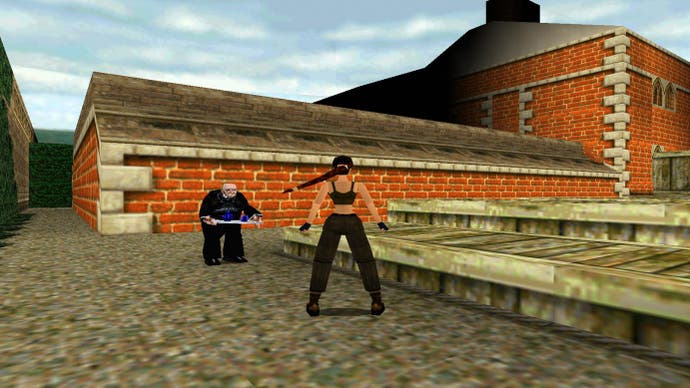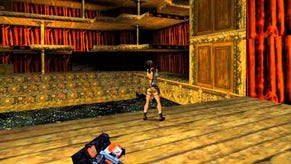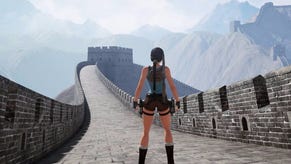25 years on, Tomb Raider 2 is still as good as it gets
Can't fathom it.
Happy 25th birthday, Tomb Raider 2. Here's a little piece to celebrate its quarter century.
Every so often I load up a walkthrough of Tomb Raider 2 and take the whole thing in again. Always a walkthrough: I have the game on Steam, but I can never get it to run quite right, and besides, part of me doesn't want to go back in person. These walkthroughs, though! Tomb Raider was a very technical platformer back in the days of the grid system, and some of these players out there are just astonishing. Their virtuosity can get in the way very occasionally, though. More specifically it can get in the way on one occasion in particular: 40 Fathoms.
40 Fathoms is an astonishing video game level, yet when I watch it on Youtube, the audacity of it never comes across in full. That's because 40 Fathoms is actually like a magic trick - you can only really experience it as it's meant to be experienced once. These walkthrough artists are too good: too decisive. They know where to go and they go there. They play 40 Fathoms like it's a video game level. Whereas what it really is, is an audacious riff on the things that video game levels aren't meant to be.
I am purely talking about the start of 40 Fathoms by the way. God, what a start. Forget No Russian or whatever it's called - this is where my idea of what games could do was spun around three times in a blindfold and pushed off, wobbling, in the wrong direction. 40 Fathoms comes about halfway through the game. Lara Croft, adventurer and T-Rex killer, is tracking an ancient Chinese relic across the world, and has just explored an abandoned oil rig in the middle of the ocean. Shit has gone down, and now she's escaping, clinging, without an air tank, to the back of a submarine that is making a break for it. But the submarine pilot is startled by sharks, and the sub hits an underwater cliff. Cue 40 Fathoms.

And you leap out of a cut-scene into, what? Into darkness. You're deep underwater. You're floating. And you're running out of oxygen from the moment you regain control. Everything is dark, it's hard to tell which way is up or down, but if you pick the wrong direction you'll very quickly find you're done for.
This is astonishing stuff, a level that kicks off by removing almost all architecture and lighting, all signs of guidance. Lara Croft is disoriented, so rather than put a visual effect on the screen or muddle the controller inputs, they just completely disorient you. They remove everything that you have been taught to use to guide yourself through levels up until now. This is what the walkthroughs never capture. They know where to go, how to follow wreckage on the sea floor until you find a sunken ship, and beyond.... All great. But the first time I played 40 Fathoms, I thought the game had broken. My PC could barely run it at the time anyway: I thought a level had half-loaded. Or maybe I had lost it myself. I couldn't conceive of a game screwing with me like that.
Tomb Raider 2 is filled with this sort of stuff, actually. Not all on the level of 40 Fathoms, but in lesser ways scattered through the game. This is probably my favourite Tomb Raider - my favourite game in a series that I properly love. And I love Tomb Raider 2 because it's wilfully different. It seems to sense the strictures that come with the first game being a mega hit. It knows it has to give players what they want - more platforming, more Croft - but it's determined not to give in and give players what they want in the way they expect it.
So a level, halfway through, in which you may well drown several times before taking your first steps. And other stuff too. Lara Croft was strongly influenced by Indiana Jones, and Indiana Jones spends all his time in the ancient world. Tomb Raider 1 obliged: Peru, Greece, Egypt, Atlantis. A textbook itinerary.
But Tomb Raider 2? The story circles ancient China, kicking off at the Great Wall and headed eventually to Tibet and back to China again. Temples and ruins. So far so Indy. But along the way: Venice, largely in the form of a massive abandoned opera house, and that oil rig, and that shipwreck.
Okay, Indy went to Venice too, but not like this. All of these places are non-ancient, but they earn their inclusion by being abandoned - boarded up in the case of the Opera House, going to ruin and sunk to the bottom of the sea in the case of the rig and the shipwreck. This gives Tomb Raider 2 a very distinctive feel. When I think of the game, I think of a colour: burnt orange, the colour of rust. I think of that ship slowly being eaten by the sea, its back broken so in many areas there are tables and chairs on the ceiling. I think of the opera house with its dusty carpeting and floors with missing slats. I think of a huge puzzle which fills a room, but it isn't a statue in a temple with jewels that need slotting into the eyes. It's the ruined engine of a vast modern ship. The game is full of this, full of gantries instead of boulder-dashes.
The thing about all these places - one of the most important reasons they stick in the mind - is that you're there in each of them for a very long time. Tomb Raider 2 is absolutely massive for one thing, but the Core games could also be fiddly and abstruse - the solution to a puzzle might be extremely counter-intuitive, or it might be a tiny puzzle piece hidden on the floor and blending with the carpet, or it might be a move - a way of extending your jump! - that you learned early on in the game and then spent the last ten hours not using, and forgetting about. This means that Tomb Raider 2 is a game where you can really get stuck. So you settle in. Croft ends up living in these worlds, and so does the player.

That's never truer than in the Opera House. In my memory I was in the Opera House for a week at least. And this is one of those moments where the memories of the game mingles with the memories of the time I played it. 1999. I had just finished university and all my friends and social connections had left town. I was working in an insurance office and renting a room at the top of a boarding house. My world had shrunken down to a bedroom, a kitchen, and the walk to work - or so it felt. My horizons had never been smaller. But every Friday I would boot up Tomb Raider 2 and have this sense of wild scale - huge places, numinous and terrifying. No wonder it took me so long to get through it.
I look back now and think: Tomb Raider 2 was ahead of its time. I think now we see these abandoned spaces that make up the game's locations as being mysterious, haunted by gods, filled with secrets and potential.
Over the years I've realised that Tomb Raider 2 is about as good as games get for me. It's up there with Zelda and all that jazz as far as I'm concerned. It's about places, interesting places which I don't get to visit in my own life. It's difficult and awkward at times, but it's transporting and intelligent and extremely beautiful. 25 years old? How can this be.










